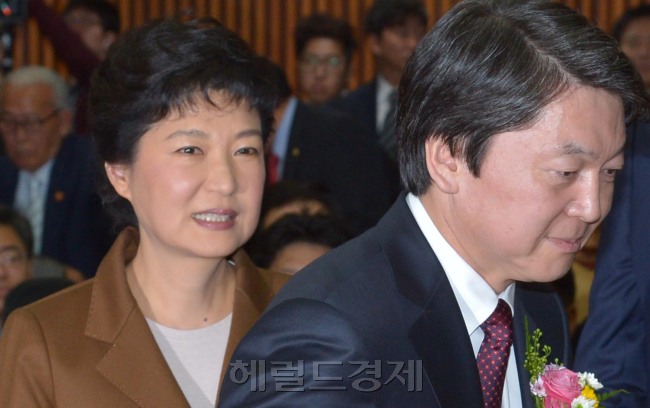Possibility of single opposition candidacy the No. 1 variable
Barely two months remain until South Korea elects its new president, but the three challengers are running a tight race, as variables such as a single opposition candidacy hang in the air, leaving this year’s presidential race largely unpredictable.
Despite the escalating war of nerves among the rivals, the voters have yet to see the complete pledges of any candidate, or witness a face-to-face showdown on their vision and policies.
The latest survey by Realmeter, however, indicates that voters don’t seem to mind too much, with the number of undecided voters just reaching 5 percent, the lowest rate in recent history. It is much lower than 25 percent around the same period in 2007 and 12 percent in 2002.
As fatigue toward political parties, yearning for reform and emphasis on economic democratization occupy the center stage, observers pointed out that the remaining variables could become game changers.
The prospects of Rep. Moon Jae-in of the main opposition Democratic United Party joining with independent candidate Ahn Cheol-soo remain as murky as a month ago.
Barely two months remain until South Korea elects its new president, but the three challengers are running a tight race, as variables such as a single opposition candidacy hang in the air, leaving this year’s presidential race largely unpredictable.
Despite the escalating war of nerves among the rivals, the voters have yet to see the complete pledges of any candidate, or witness a face-to-face showdown on their vision and policies.
The latest survey by Realmeter, however, indicates that voters don’t seem to mind too much, with the number of undecided voters just reaching 5 percent, the lowest rate in recent history. It is much lower than 25 percent around the same period in 2007 and 12 percent in 2002.
As fatigue toward political parties, yearning for reform and emphasis on economic democratization occupy the center stage, observers pointed out that the remaining variables could become game changers.
The prospects of Rep. Moon Jae-in of the main opposition Democratic United Party joining with independent candidate Ahn Cheol-soo remain as murky as a month ago.


Although their popularity ratings run neck-and-neck with the ruling Saenuri Party’s candidate Rep. Park Geun-hye, it is considered tough for them to individually prevail over the former party chairwoman.
Wide-ranging methods have been discussed for Moon and Ahn to repeat the successful agreement of Ahn Cheol-soo and Seoul Mayor Park Won-soon last year.
“It looks nearly impossible. The reason why the agreement between Ahn and Park was such a refreshing surprise and touched many was because they agreed without condition on (Park’s single candidacy) and Ahn quietly took a backseat,” said politics professor Shin Yul of Myongji University.
The DUP is so far keener on working together, suggesting a joint political reform committee, only to be shunned by Ahn.
Moon has also started his campaign with a proposal to Ahn to form a joint government in which they would share power.
Extending their support base is considered crucial in gaining the upper hand in any future alliance. For Moon, it is to discard his pro-Roh Moo-hyun image. Although he touts his partisan support as his biggest asset, Moon is yet to see high support from the DUP’s political homeland Jeolla Province. For Ahn, it is to reinforce his relatively weak organizational power. Solidifying his own support base beyond 20 and 30-somethings is also considered crucial.
“Even if they do form an alliance, we can deem that it won’t happen until after mid-November,” Shin said. “That would be the time that the alliance would bring the most dramatic impact, not to mention how both need time to maximize their voter appeal.”
Voter turnout is also a key variable in the neck-and-neck race.
Polling experts generally view a voting rate above 70 percent as benefitting the opposition contenders, and vice versa if the rate is less than 65 percent.
A 65 percent to 70 percent voting rate will mean a razor-thin win.
The voting rate for the 2007 presidential election where President Lee Myung-bak seized victory was 63 percent. The 2002 voting rate was 70.8 percent, upon which former President Roh Moo-hyun assumed office.
Another variable is the intensifying negative campaigns against each candidate. Park is repeatedly attacked for her historical perceptions and past association with the remnants of her father’s authoritarian rule.
For Moon, his role in the former Roh Moo-hyun administration remains his biggest burden, despite it having opened the door to politics for him.
Ahn, in the meantime, is a novice to the political world and more exposed to attacks.
“Generally, the shorter the candidate has been exposed to the public, the stronger the attacks that the candidate may face. It is because ordinary politicians have long been exposed to the public and much of the controversies have already been put out,” Shin said.
North Korea also remains a variable, albeit different than before.
Ahead of the 2007 presidential election, North Korea conducted a nuclear test in 2006, escalating tension on the Korean Peninsula and heightening calls for security.
Before the 2010 election of local government heads, the sinking of the Cheonan warship shook the nation.
But observers point out that the North Korea factor no longer provides advantage to the conservative candidate. Upon the Cheonan sinking, the DUP won against the then-Grand National Party by highlighting a need for peace instead of war.
“This proves that even if there is a provocation by North Korea, its impact on the election largely hinges on who wins in managing the situation with their own frame,” Shin said.
Other variables include the turnout of women voters and whether the country wishes to see its first woman president.
By Lee Joo-hee (jhl@heraldcorp.com)
-
Articles by Korea Herald




















![[Today’s K-pop] Le Sserafim garners 100m views with ‘Eve’ music video](http://res.heraldm.com/phpwas/restmb_idxmake.php?idx=642&simg=/content/image/2024/05/24/20240524050572_0.jpg&u=)